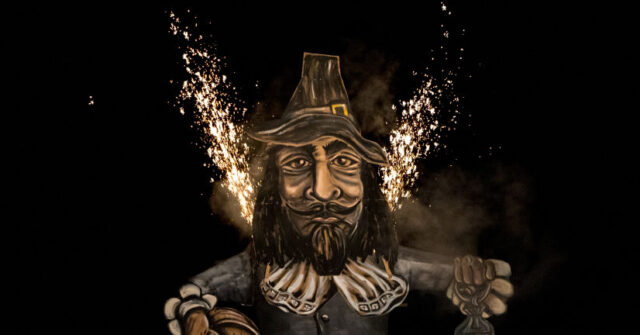Every year in Britain, a unique holiday known as Guy Fawkes Night is commemorated, celebrating the foiling of a violent conspiracy against the monarchy and Parliament that took place in 1605. Once a vibrant observance marked by community bonfires and firework displays, Guy Fawkes Night is slowly fading from collective memory, becoming more of a historical curiosity than a widely observed cultural event. The holiday’s significance lies in its roots as a protest against extremist views and has traditionally symbolized the triumph of societal norms over terrorism. Unfortunately, changing societal dynamics and external pressures seem to threaten the very existence of this distinctly British holiday, leaving cultural historians to ponder its future relevance.
A particularly unusual cultural moment arose in 2024 with significant political events coinciding on both sides of the Atlantic: the UK General Election occurring on July 4th and the U.S. Presidential Election on November 5th. Many recall the nursery rhyme associated with Guy Fawkes Night, which serves as a reminder of the plot’s historical importance, yet few understand the deeper implications of the events it commemorates. The lines of the rhyme encapsulate the essence of the day—it serves as a reminder to never forget this landmark moment in British history that involved treason and a conspiracy that sought to obliterate the existing political order.
The COVID-19 pandemic has disrupted long-established traditions across the globe, including the observance of Guy Fawkes Night. Tighter local government budgets, driven largely by a shift in focus towards pressing social concerns like health care, have led to a decline in community events commemorating this holiday. Other factors including its proximity to Halloween, alterations in the timing of celebrations, and a growing environmental consciousness have contributed to the diminishing number of bonfires and fireworks displays. Consequently, the once-unified celebrations have dispersed into smaller gatherings or been abandoned entirely, as more councils cite costs and noise complaints as reasons for cancellation.
Despite these setbacks, certain areas of Britain still maintain vibrant Guy Fawkes traditions. Festivals such as the grand displays in Lewes, where effigies are paraded, and the flaming barrel-carrying events in Ottery St Mary revel in the historical roots of the holiday. Yet, while localized festivities continue, the broader national experience is shifting toward a more muted observance. Reports from various towns indicate that as each November passes, fewer organized public events take place, signaling a trend towards the overshadowing of this holiday by modern concerns and a societal inclination toward quietness rather than jubilant celebration.
Interestingly, parallels can be drawn between the historical context of the Gunpowder Plot and modern political climates. Speculative interpretations of the events of 1605 reveal themes that resonate with current occurrences in society. For example, the escape of a prominent political figure from an assassination attempt can echo today’s climate, where fears of extremism can provoke strong national responses. Observations often arise juxtaposing the conspirators of King James I’s era with present-day extremists, revealing a cyclical nature of political violence in the name of beliefs. Guy Fawkes, although not the principal architect of the plot, became emblematic of the struggle against authoritarianism, creating a multifaceted discussion regarding political dissent and the acceptable means through which it may manifest.
However, the current cultural appropriation of the Guy Fawkes mask speaks to a misunderstanding of the holiday’s origins. What began as a commemoration of civic triumph and the rejection of extremist ideologies has morphed into a symbol of anarchy, misinterpreted by activists advocating for various causes. Ironically, Fawkes sought to replace one authoritarian regime with another, contentions that are often overlooked in contemporary retellings. As a result, Guy Fawkes Night stands as an opportunity for reflection on the larger themes of rebellion and authority, making the observance highly relevant in today’s sociopolitical landscape.
In conclusion, the essence of Guy Fawkes Night rests on its historical foundations, resilience against extremism, and the celebration of communal memory. It invites both Britons and Americans to acknowledge their shared history of confronting radical elements and emerging triumphant. The challenge is to preserve this cultural narrative as society evolves, ensuring that the lessons of the past remain relevant in contemporary discourse. As November 5th approaches, it serves as a profound reminder to reflect upon the fragility of freedoms won through struggle and the collective responsibility to safeguard them against modern threats, even as traditional celebrations face decline.

